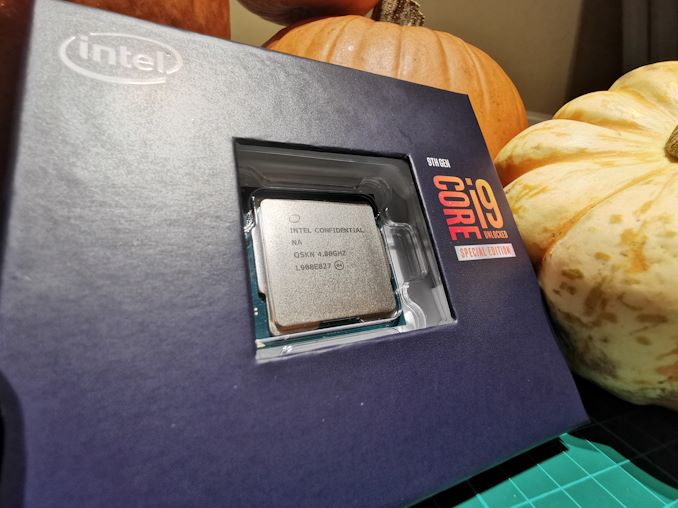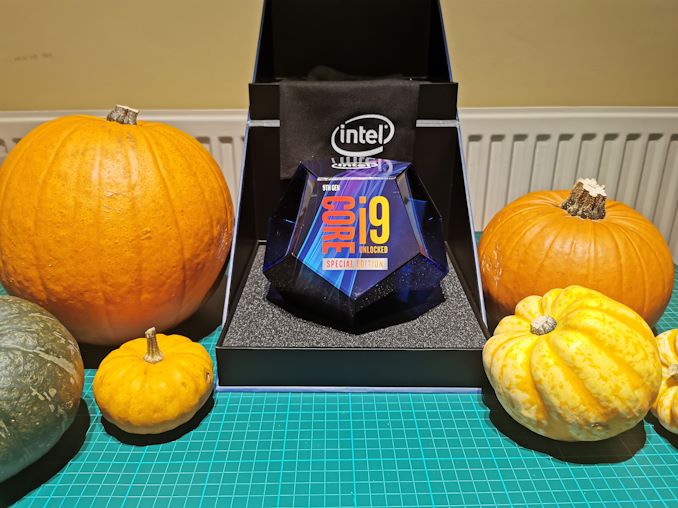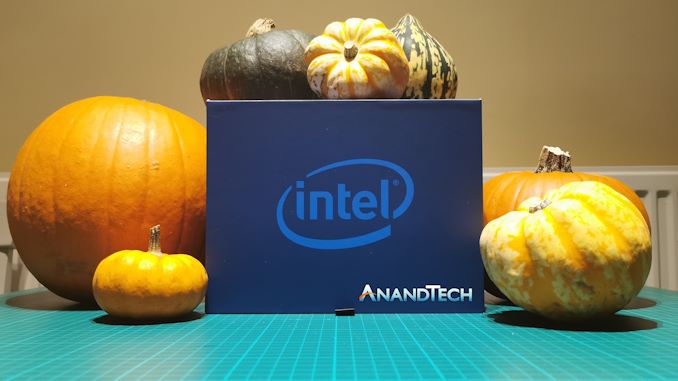The Intel Core i9-9900KS Review: The 5 GHz Consumer Special
by Dr. Ian Cutress on October 31, 2019 10:45 AM ESTConclusion
The Intel Core i9-9900KS is Intel’s first consumer level all-core 5.0 GHz processor. Technically Intel has launched an all 5.0 GHz processor before: earlier this year the Core i9-9990XE was launched into the high-frequency trading market, which had 14 cores at 5.0 GHz, but that part is an auction only part for select business partners. What the Core i9-9900KS does is bring the same principle down to a more consumer friendly core count and a more consumer friendly price point. The tray price is set at $513, although it’s likely to be sold for much more than that.
Playing To Power
One of the key elements I wanted to test in this review is how the chip responds to Turbo. As we’ve discussed at length, and confirmed by Intel: the guidelines for the Turbo settings are not set in stone. Intel actively encourages its motherboard partners to increase these settings if the motherboards are over-engineered to be able to do so. This means that a high-end motherboard should be able to give a longer turbo than a cheap board.
A longer turbo might not mean much. When the turbo budget has run out, the system will limit the chip to the TDP setting in the BIOS (which should be the one on the box), and will try and maximise the frequency for the power limit. On a lot of chips, this means you still have a very high frequency, nowhere near the base frequency. But the power limit does have benefits such as acting as a thermal control at least.
In our test, we used MSI’s Z390 Gaming Edge AC. It’s a mid-upper motherboard, but it set our Core i9-9900KS to have a TDP and turbo power limit of 255W. Intel’s ‘guidelines’ state a TDP of 127 W and a turbo power limit of 159 W. When comparing the two, there are some distinct advantages for the 255W setting, such as 10%+ performance on rendering, but the 159W setting does afford 10C lower temperatures in those heavy workloads. Ultimately, as the name TDP = Thermal Design Power implies, it all comes down on your ability to cool the chip.
For gaming, the turbo budget didn’t seem to matter at all, except in a few tests at super low resolution and settings.
One question that does remain however, is which set of results should we keep? The 255W results are what we get out of the box, and the 159W results are only 'Intel guidelines that Intel expects none of the board manufacturers to keep to'. Ideally we keep both, but that's a mess in its own right.
Planning Against The Competition
There’s no getting around giving Intel kudos for binning enough processors to commercially sell an all-core 5.0 GHz chip. In our benchmarks, we see it steaming ahead of any other consumer grade processor when it comes to single core performance. Users are likely to be able to push that single (or dual) core turbo a bit higher as well, although the power limits should be monitored.
It should be noted that in most cases, the Core i9-9900KS either matched or excelled against the previous king of Intel’s consumer desktop line, the Core i9-9900K. There were a few select instances, namely benchmarks like Handbrake, DigiCortex, F1 2018, and 7-zip, where we did see performance regressions that we weren’t expecting. We’re going to have to go back to Intel to see exactly what these are. But they seem confined to very specific workloads.
Overall, the Core i9-9900KS is Intel’s best ever consumer processor.
In ST performance metrics, it wins. In variable threaded metrics, it either wins or does really well. In MT performance metrics, it depends on how strong AMD’s 12-core hardware really is, and how multithreaded the calculation really is. As Intel slowly adds AVX-512 to its consumer line, as it is with Ice Lake, then the MT competition is going to be really interesting.
Only Available For A Short Time Only
While the Core i9-9990XE is a 14-core 5.0 GHz chip, it is an OEM only part sold by Intel at auction only, whereas the Core i9-9900KS should experience wider availability at retail, albeit for a limited time.
Our colleagues at Tom’s Hardware reported that Intel stated in a promotional video that the processor would only be available during the holiday season of 2019 – or at least that the stock level would not be replenished after the holiday season. When we approached Intel asking for confirmation, we were told:
This special edition processor will be available for a limited time only. It can be found at retailers worldwide. We are not disclosing unit quantity information. However, the Core i9-9900KS will have very limited availability.
There is no doubt that there will be some CPUs available into 2020, however it would appear that Intel is only making one main batch of hardware, and once it has gone, it has gone. This might make the $513 tray price that Intel is putting on the part a bit of a misnomer, as retailers might take advantage of this. This will take the shine off the Core i9-9900KS a little, as at $529 or so it would easily be recommended over a Core i9-9900K. If it goes to $599 or $649 because of its limited release, then it becomes less of an interesting buy.
Ultimately the Core i9-9900KS is going to end up in the hands of enthusiasts who want nothing more than the best, but don’t want to jump to the high-end desktop platform. Despite the Intel chipsets for consumers, it’s still a shame that these processors only have 16 PCIe 3.0 lanes, given the desire for direct attached PCIe storage in this market.













235 Comments
View All Comments
amnesia0287 - Saturday, November 16, 2019 - link
Can’t tell if playing stupid or srs.The IPC advantage is 10%, the clock speed advantage is >10%.
Intel chips all the cores are able to boost to the same levels. AMD chips now have varying spec cores and only the best 1-2 hit the advertised speeds and only when there are only a few threads running. If you are doing heavy multitasking, most of the AMD cores will be dramatically slower than those of the 9900ks.
That said the AMD chips still have a number of other advantages such as more pci bandwidth and no tiny DMI bottleneck. Lower cost, lower power use and generally more cores.
Right now it really comes down to what you plan to use it for. There is little doubt AMD is in a better spot right now, but it remains to be seen if they can hold it past 2021 as intel transitions to 7nm and MCM.
Korguz - Saturday, November 16, 2019 - link
" The IPC advantage is 10%, the clock speed advantage is >10%." and WHY do you think intel has the lead, even barely, in some cases. because of the clock speed advantage. Intel's cpus NEED this advantage just to keep the performance they have. think about it, a LOWER clocked chip over all is performing about the same,( depending on usage ) and in some cases better, then the higher clocked equivalents clock these chips the same, and i bet the story would be quite different. " Intel chips all the cores are able to boost to the same levels " at quite a bit more power usage too." 2021 as intel transitions to 7nm and MCM. " more like IF intel can transition to 7nm by then, look how long it has taken them to get to 10nm..
shaolin95 - Monday, November 11, 2019 - link
*cough, cough* butthurt AMD fanboy detected *cough, cough*Qasar - Monday, November 11, 2019 - link
how so ??? seems there are more intel fans but hurt lately...peevee - Friday, November 1, 2019 - link
:)Funny, I had exactly the same thought.
But honestly, for many real world uses (games etc) 4 cores at even faster frequency would be even better. Physically separated on the die as far as possible (in the corners) by huge amount of shared L3.
I guess 5GHz base/6GHz turbo is not out of the question within the same TDP with liquid cooling.
eva02langley - Thursday, October 31, 2019 - link
A joke of a CPU. How can this cost more than a 3900x?eva02langley - Thursday, October 31, 2019 - link
Not to mention that with the price gouging, you are almost near the MSRP of the 3950x.prophet001 - Thursday, October 31, 2019 - link
People want this for clock speed.12 slow cores aren't helpful if you need a few fast ones.
eva02langley - Thursday, October 31, 2019 - link
AHAHAHA... okay, we have a blind fanboy here. Do you know anything about IPC? This CPU get destroyed in EVERYTHING except old games running outdated engines at 1080p. SO unless you buy this with a 2080 TI and a 240Hz 1080p monitor, you are not going to benefit from it.Basically, with a budget, the 9900KS is a waste of money, period. The money you save buying a 3700x and investing in your GPU will give you some serious gaming performances increase.
xenol - Thursday, October 31, 2019 - link
Honestly anything more than a midrange CPU and GPU is a waste of money for most people.